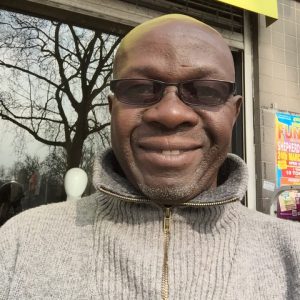Dr. Assaf Anyamba
Where are you from?
Greenbelt, Maryland.
What do you do?
I am currently a research scientist with the Universities Space Research Association at NASA Goddard Space Flight Center, Biospheric Sciences Laboratory. My research basically involves time series analysis of satellite vegetation index measurements from a variety of satellite sensors (Terra/Aqua, Moderate-Resolution Imaging Spectroradiometer, National Oceanic and Atmospheric Administration – Advanced Very High Resolution Radiometer and follow-on missions with a focus on determining and understanding land surface response to inter-annual climate variability associated with El Niño/Southern Oscillation (ENSO).
What missions are you involved in and how do they relate to GLOBE Observer?
I am not involved on any missions per se, rather on utilizing data from a variety of missions and translating them into various applications to support partner federal government agencies (United States Department of Agriculture – Foreign Agricultural Service, U.S. Department of Defense – Defense Health Agency Armed – Forces Health Surveillance Branch, USDA-Agricultural Research Service – Center for Medical, Agricultural & Veterinary Entomology and U.S. Food and Drug Administration – Center for Food Safety and Applied Nutrition. On GLOBE Observer my contribution will be on the links between weather/climate variability and vector-borne disease outbreaks.
What was your career path?
I am trained as a geographer, originally specializing in physical geography and cartography at the undergraduate level (Kenyatta University, Kenya), but always had an interest in understanding the dynamic environment, which led me to study remote sensing of vegetation and the possibility of extracting signals and patterns of El Niño/Southern Oscillation (ENSO) from satellite derived vegetation index measurement during my graduate school (Ohio University, Athens, Ohio and Clark University, Worcester, Massachusetts). In order to pursue this study, I had to become conversant in multi-disciplinary fields involving climatology/meteorology, biogeography, statistics, etc. Since arriving at Goddard in 1998, I have pursued and grown my interdisciplinary and collaborative work to encompass agriculture and ecology of vector-borne diseases by working with others from different fields to understand how weather and climate variability influences patterns of floods, drought and how it impacts agricultural production and vector borne disease emergence globally.
Why is citizen science important to you?
Engaging the public in scientific research is beneficial to society as a whole on various levels, for example it enables citizens to gather critical data in areas where it may not be possible by scientists on a regular basis, it educates the public on scientific methods and enables scientists to get feedback or viewpoints from the public which is in enriching in itself. It enables the public to be better informed about the findings of scientific research.
What advice do you have for people just getting into citizen science?
Engage, experiment, have fun, it is the road to discovery; it may lead to a future career.
What do you do for fun?
I like to play soccer, watch soccer and anything outdoors, I make the meanest Chai (Tea Masala), and I love listening to NPR (I am an NPR Junkie J).
Who/what inspires you?
Along the journey of my life I have been inspired by my Mum, and my teachers from kindergarten to graduate school. Every sunrise is the magic that inspires me, that today can be better than yesterday.
Any favorite quote(s) that you would like to share?
My favorite quote is: “…We do not inherit the earth from our ancestors; we borrow it from our children.” — Native American Proverb


Comments are closed.